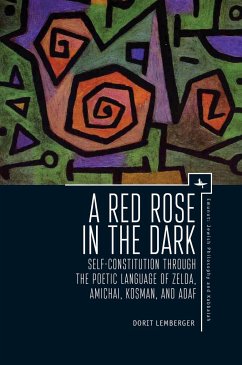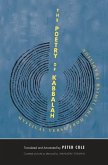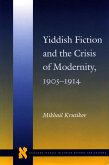Dorit LembergerSelf-Constitution Through the Poetic Language of Zelda, Amichai, Kosman, and Adaf
A Red Rose in the Dark
Self-Constitution Through the Poetic Language of Zelda, Amichai, Kosman, and Adaf
Übersetzer: Levin, Edward
Schade – dieser Artikel ist leider ausverkauft. Sobald wir wissen, ob und wann der Artikel wieder verfügbar ist, informieren wir Sie an dieser Stelle.
Dorit LembergerSelf-Constitution Through the Poetic Language of Zelda, Amichai, Kosman, and Adaf
A Red Rose in the Dark
Self-Constitution Through the Poetic Language of Zelda, Amichai, Kosman, and Adaf
Übersetzer: Levin, Edward
- Gebundenes Buch
- Merkliste
- Auf die Merkliste
- Bewerten Bewerten
- Teilen
- Produkt teilen
- Produkterinnerung
- Produkterinnerung
Following Wittgenstein, this book investigates the dialogic, aesthetic and mystical language-games of Zelda, Yehuda Amichai, Admiel Kosman, and Shimon Adaf based on their family resemblance of intertextuality in their language-games. It resists common social-cultural categorizations while focusing on Wittgenstein's universal concepts.
Andere Kunden interessierten sich auch für
![On Revival On Revival]() Roni HenigOn Revival58,99 €
Roni HenigOn Revival58,99 €![Israeli Poetry of the Holocaust Israeli Poetry of the Holocaust]() Yair MazorIsraeli Poetry of the Holocaust124,99 €
Yair MazorIsraeli Poetry of the Holocaust124,99 €![Singing in a Strange Land Singing in a Strange Land]() Maeera Y ShreiberSinging in a Strange Land87,99 €
Maeera Y ShreiberSinging in a Strange Land87,99 €![Who Wants to Be a Jewish Writer? Who Wants to Be a Jewish Writer?]() Adam KirschWho Wants to Be a Jewish Writer?30,99 €
Adam KirschWho Wants to Be a Jewish Writer?30,99 €![The Parallel Universes of David Shrayer-Petrov The Parallel Universes of David Shrayer-Petrov]() The Parallel Universes of David Shrayer-Petrov126,99 €
The Parallel Universes of David Shrayer-Petrov126,99 €![The Poetry of Kabbalah The Poetry of Kabbalah]() Peter ColeThe Poetry of Kabbalah19,99 €
Peter ColeThe Poetry of Kabbalah19,99 €![Yiddish Fiction and the Crisis of Modernity, 1905-1914 Yiddish Fiction and the Crisis of Modernity, 1905-1914]() Mikhail KrutikovYiddish Fiction and the Crisis of Modernity, 1905-191487,99 €
Mikhail KrutikovYiddish Fiction and the Crisis of Modernity, 1905-191487,99 €-
-
Following Wittgenstein, this book investigates the dialogic, aesthetic and mystical language-games of Zelda, Yehuda Amichai, Admiel Kosman, and Shimon Adaf based on their family resemblance of intertextuality in their language-games. It resists common social-cultural categorizations while focusing on Wittgenstein's universal concepts.
Produktdetails
- Produktdetails
- Verlag: Academic Studies Press
- Seitenzahl: 430
- Erscheinungstermin: 30. Juni 2016
- Englisch
- Abmessung: 234mm x 156mm x 24mm
- Gewicht: 767g
- ISBN-13: 9781618114938
- ISBN-10: 161811493X
- Artikelnr.: 44266288
- Herstellerkennzeichnung
- Libri GmbH
- Europaallee 1
- 36244 Bad Hersfeld
- gpsr@libri.de
- Verlag: Academic Studies Press
- Seitenzahl: 430
- Erscheinungstermin: 30. Juni 2016
- Englisch
- Abmessung: 234mm x 156mm x 24mm
- Gewicht: 767g
- ISBN-13: 9781618114938
- ISBN-10: 161811493X
- Artikelnr.: 44266288
- Herstellerkennzeichnung
- Libri GmbH
- Europaallee 1
- 36244 Bad Hersfeld
- gpsr@libri.de
As a lecturer in the unit of interdisciplinary studies in Bar-Ilan University, Dorit Lemberger's researches exemplify the relevance and importance of linguistic concepts to Hebrew literature and Jewish philosophy. Also, I use psychoanalytic insights in order to show the common linguistic ground of literature and psychoanalysis, as 'talking-cure'.
Preface Chapter One Poetic Grammar: Three Aspects of Aesthetic Judgment 1. Examination and Judgment of Aesthetic Language: The Fundamental Tension 2. The First Aspect: A Poetic Work as Driving Reflective Introspection 3. The Second Aspect: Conscious Change as the Key to Aesthetic Judgment 4. The Third Aspect: Showing What Cannot Be Said Summation Chapter Two Dialogical Grammar: Variations of Dialogue in Wittgenstein
s Methodology as Ways of Self-Constitution 1.
Family Resemblance
between the Platonic Dialogue and Wittgenstein
s Methodology 1.1. Wittgenstein
s Critique of Socrates 1.2. Similarities between Wittgensteinian and Socratic Dialogue 1.3. Language as a Medium of Thought: Soliloquy as Ordinary Language 1.4. Reflective Dialogue: Dialogue between Sense-Perception and Image 2. Wittgensteinian Dialogical Grammar in the Philosophical Investigations: Rhetorical, Conversational, Reflective 2.1. Dialogism in the Philosophical Investigations:
A Surveyable Representation
2.2. Aspects of Dialogism 2.3. Dialogue as Technique 2.4. Conversational Dialogue 2.5. Reflective Dialogue Chapter Three Self-Constitution through Mystical Grammar: The Urge and Its Expressions Three Channels of Mystical Grammar 1. Preliminary Considerations: Theology as Grammar and the Metaphysical Subject 2. The Mystical-Religious Channel: The Religious Aspect of Mystical Grammar 3. Who Is Experiencing? The Paradox of the I and the
Solution
of the Mystic Subject 4. I as Object
I as Subject: From James to Wittgenstein 5. From Perfectionism to Confession: Work on Oneself Chapter Four Zelda: The Complex Self-Constitution of the Believer 1. Expression and Conversion between Everyday and Poetic Grammar 2. Dialogic Grammar: Internal and External Observations 3. Mystical Grammar: Perfectionism and Metaphysics as Zeldäs Varieties of Religious Experience Chapter Five Yehuda Amichai: Amen and Love 1. The Poetics of Change: The Grammaticalization of Experience 2. Dialogic Grammar: The Importance of Otherness 3. Reconstruction of the Subject: The Mystical Grammar of Open Closed Open 3.1. The Mechanism of Change as the Key to Perfectionism 3.2. The Conception of an Individual God: God as Change and as Interlocutor 3.3. The Encounter with Biblical Word-Games as the Key to the Reconstruction of the Self 3.4. The Refashioning of Religious Rituals as an Expression of Intersubjective Change of the Self Chapter Six Admiel Kosman: We Reached God The Popping Self 1. The Poetic Grammar of Revolution: The New Believer 1.1. How to Do Things with Words: The Weekly Torah Portion 1.2. When All the Words Are Finished
All Is Intoxicated from Clarity 2. Dialogical Grammar: Self-Constitution as Conversational Process 3. Mystical Grammar: Private Pain and Manifestation of the Other Chapter Seven Shimon Adaf: Poetry as Philosophy and Philosophy as Poetry The Nobility of Pain 1. Icarus Monologue: The Poetic Grammar of Hybrid Imagination 2. What I Thought Shadow Is the Real Body: The Dialogical Grammar of Place, Time, and Memory 2.1. Poetry as a Chronological and Thematic Point of Departure 2.2. The Subject as the Limit of the World 3. Aviva-No: The Grammar of Mourning 4. The Way Music Speaks Summation:
As if I Could Read the Darkness
Index
s Methodology as Ways of Self-Constitution 1.
Family Resemblance
between the Platonic Dialogue and Wittgenstein
s Methodology 1.1. Wittgenstein
s Critique of Socrates 1.2. Similarities between Wittgensteinian and Socratic Dialogue 1.3. Language as a Medium of Thought: Soliloquy as Ordinary Language 1.4. Reflective Dialogue: Dialogue between Sense-Perception and Image 2. Wittgensteinian Dialogical Grammar in the Philosophical Investigations: Rhetorical, Conversational, Reflective 2.1. Dialogism in the Philosophical Investigations:
A Surveyable Representation
2.2. Aspects of Dialogism 2.3. Dialogue as Technique 2.4. Conversational Dialogue 2.5. Reflective Dialogue Chapter Three Self-Constitution through Mystical Grammar: The Urge and Its Expressions Three Channels of Mystical Grammar 1. Preliminary Considerations: Theology as Grammar and the Metaphysical Subject 2. The Mystical-Religious Channel: The Religious Aspect of Mystical Grammar 3. Who Is Experiencing? The Paradox of the I and the
Solution
of the Mystic Subject 4. I as Object
I as Subject: From James to Wittgenstein 5. From Perfectionism to Confession: Work on Oneself Chapter Four Zelda: The Complex Self-Constitution of the Believer 1. Expression and Conversion between Everyday and Poetic Grammar 2. Dialogic Grammar: Internal and External Observations 3. Mystical Grammar: Perfectionism and Metaphysics as Zeldäs Varieties of Religious Experience Chapter Five Yehuda Amichai: Amen and Love 1. The Poetics of Change: The Grammaticalization of Experience 2. Dialogic Grammar: The Importance of Otherness 3. Reconstruction of the Subject: The Mystical Grammar of Open Closed Open 3.1. The Mechanism of Change as the Key to Perfectionism 3.2. The Conception of an Individual God: God as Change and as Interlocutor 3.3. The Encounter with Biblical Word-Games as the Key to the Reconstruction of the Self 3.4. The Refashioning of Religious Rituals as an Expression of Intersubjective Change of the Self Chapter Six Admiel Kosman: We Reached God The Popping Self 1. The Poetic Grammar of Revolution: The New Believer 1.1. How to Do Things with Words: The Weekly Torah Portion 1.2. When All the Words Are Finished
All Is Intoxicated from Clarity 2. Dialogical Grammar: Self-Constitution as Conversational Process 3. Mystical Grammar: Private Pain and Manifestation of the Other Chapter Seven Shimon Adaf: Poetry as Philosophy and Philosophy as Poetry The Nobility of Pain 1. Icarus Monologue: The Poetic Grammar of Hybrid Imagination 2. What I Thought Shadow Is the Real Body: The Dialogical Grammar of Place, Time, and Memory 2.1. Poetry as a Chronological and Thematic Point of Departure 2.2. The Subject as the Limit of the World 3. Aviva-No: The Grammar of Mourning 4. The Way Music Speaks Summation:
As if I Could Read the Darkness
Index
Preface Chapter One Poetic Grammar: Three Aspects of Aesthetic Judgment 1. Examination and Judgment of Aesthetic Language: The Fundamental Tension 2. The First Aspect: A Poetic Work as Driving Reflective Introspection 3. The Second Aspect: Conscious Change as the Key to Aesthetic Judgment 4. The Third Aspect: Showing What Cannot Be Said Summation Chapter Two Dialogical Grammar: Variations of Dialogue in Wittgenstein
s Methodology as Ways of Self-Constitution 1.
Family Resemblance
between the Platonic Dialogue and Wittgenstein
s Methodology 1.1. Wittgenstein
s Critique of Socrates 1.2. Similarities between Wittgensteinian and Socratic Dialogue 1.3. Language as a Medium of Thought: Soliloquy as Ordinary Language 1.4. Reflective Dialogue: Dialogue between Sense-Perception and Image 2. Wittgensteinian Dialogical Grammar in the Philosophical Investigations: Rhetorical, Conversational, Reflective 2.1. Dialogism in the Philosophical Investigations:
A Surveyable Representation
2.2. Aspects of Dialogism 2.3. Dialogue as Technique 2.4. Conversational Dialogue 2.5. Reflective Dialogue Chapter Three Self-Constitution through Mystical Grammar: The Urge and Its Expressions Three Channels of Mystical Grammar 1. Preliminary Considerations: Theology as Grammar and the Metaphysical Subject 2. The Mystical-Religious Channel: The Religious Aspect of Mystical Grammar 3. Who Is Experiencing? The Paradox of the I and the
Solution
of the Mystic Subject 4. I as Object
I as Subject: From James to Wittgenstein 5. From Perfectionism to Confession: Work on Oneself Chapter Four Zelda: The Complex Self-Constitution of the Believer 1. Expression and Conversion between Everyday and Poetic Grammar 2. Dialogic Grammar: Internal and External Observations 3. Mystical Grammar: Perfectionism and Metaphysics as Zeldäs Varieties of Religious Experience Chapter Five Yehuda Amichai: Amen and Love 1. The Poetics of Change: The Grammaticalization of Experience 2. Dialogic Grammar: The Importance of Otherness 3. Reconstruction of the Subject: The Mystical Grammar of Open Closed Open 3.1. The Mechanism of Change as the Key to Perfectionism 3.2. The Conception of an Individual God: God as Change and as Interlocutor 3.3. The Encounter with Biblical Word-Games as the Key to the Reconstruction of the Self 3.4. The Refashioning of Religious Rituals as an Expression of Intersubjective Change of the Self Chapter Six Admiel Kosman: We Reached God The Popping Self 1. The Poetic Grammar of Revolution: The New Believer 1.1. How to Do Things with Words: The Weekly Torah Portion 1.2. When All the Words Are Finished
All Is Intoxicated from Clarity 2. Dialogical Grammar: Self-Constitution as Conversational Process 3. Mystical Grammar: Private Pain and Manifestation of the Other Chapter Seven Shimon Adaf: Poetry as Philosophy and Philosophy as Poetry The Nobility of Pain 1. Icarus Monologue: The Poetic Grammar of Hybrid Imagination 2. What I Thought Shadow Is the Real Body: The Dialogical Grammar of Place, Time, and Memory 2.1. Poetry as a Chronological and Thematic Point of Departure 2.2. The Subject as the Limit of the World 3. Aviva-No: The Grammar of Mourning 4. The Way Music Speaks Summation:
As if I Could Read the Darkness
Index
s Methodology as Ways of Self-Constitution 1.
Family Resemblance
between the Platonic Dialogue and Wittgenstein
s Methodology 1.1. Wittgenstein
s Critique of Socrates 1.2. Similarities between Wittgensteinian and Socratic Dialogue 1.3. Language as a Medium of Thought: Soliloquy as Ordinary Language 1.4. Reflective Dialogue: Dialogue between Sense-Perception and Image 2. Wittgensteinian Dialogical Grammar in the Philosophical Investigations: Rhetorical, Conversational, Reflective 2.1. Dialogism in the Philosophical Investigations:
A Surveyable Representation
2.2. Aspects of Dialogism 2.3. Dialogue as Technique 2.4. Conversational Dialogue 2.5. Reflective Dialogue Chapter Three Self-Constitution through Mystical Grammar: The Urge and Its Expressions Three Channels of Mystical Grammar 1. Preliminary Considerations: Theology as Grammar and the Metaphysical Subject 2. The Mystical-Religious Channel: The Religious Aspect of Mystical Grammar 3. Who Is Experiencing? The Paradox of the I and the
Solution
of the Mystic Subject 4. I as Object
I as Subject: From James to Wittgenstein 5. From Perfectionism to Confession: Work on Oneself Chapter Four Zelda: The Complex Self-Constitution of the Believer 1. Expression and Conversion between Everyday and Poetic Grammar 2. Dialogic Grammar: Internal and External Observations 3. Mystical Grammar: Perfectionism and Metaphysics as Zeldäs Varieties of Religious Experience Chapter Five Yehuda Amichai: Amen and Love 1. The Poetics of Change: The Grammaticalization of Experience 2. Dialogic Grammar: The Importance of Otherness 3. Reconstruction of the Subject: The Mystical Grammar of Open Closed Open 3.1. The Mechanism of Change as the Key to Perfectionism 3.2. The Conception of an Individual God: God as Change and as Interlocutor 3.3. The Encounter with Biblical Word-Games as the Key to the Reconstruction of the Self 3.4. The Refashioning of Religious Rituals as an Expression of Intersubjective Change of the Self Chapter Six Admiel Kosman: We Reached God The Popping Self 1. The Poetic Grammar of Revolution: The New Believer 1.1. How to Do Things with Words: The Weekly Torah Portion 1.2. When All the Words Are Finished
All Is Intoxicated from Clarity 2. Dialogical Grammar: Self-Constitution as Conversational Process 3. Mystical Grammar: Private Pain and Manifestation of the Other Chapter Seven Shimon Adaf: Poetry as Philosophy and Philosophy as Poetry The Nobility of Pain 1. Icarus Monologue: The Poetic Grammar of Hybrid Imagination 2. What I Thought Shadow Is the Real Body: The Dialogical Grammar of Place, Time, and Memory 2.1. Poetry as a Chronological and Thematic Point of Departure 2.2. The Subject as the Limit of the World 3. Aviva-No: The Grammar of Mourning 4. The Way Music Speaks Summation:
As if I Could Read the Darkness
Index








